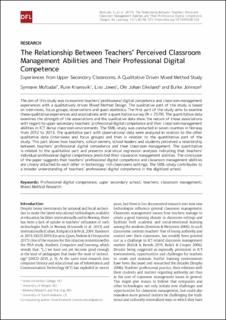| dc.contributor.author | Moltudal, Synnøve | |
| dc.contributor.author | Krumsvik, Rune Johan | |
| dc.contributor.author | Jones, Lise Øen | |
| dc.contributor.author | Eikeland, Ole-Johan | |
| dc.contributor.author | Johnson, Burke | |
| dc.date.accessioned | 2023-01-10T10:22:03Z | |
| dc.date.available | 2023-01-10T10:22:03Z | |
| dc.date.created | 2019-02-23T14:41:26Z | |
| dc.date.issued | 2019 | |
| dc.identifier.citation | Designs for Learning. 2019, 11 (1), 80-98. | en_US |
| dc.identifier.issn | 1654-7608 | |
| dc.identifier.uri | https://hdl.handle.net/11250/3042254 | |
| dc.description.abstract | The aim of this study was to examine teachers’ professional digital competence and classroom management experiences with a qualitatively driven Mixed Method Design. The qualitative part of the study is based on interviews, focus groups, observations and quasi statistics. The first part of the study aims to examine these qualitative experiences and associations with a quantitative survey (N = 2579). The quantitative data examines the strength of the associations and the qualitative data show the nature of those associations with regard to upper secondary teachers’ professional digital competence and their classroom management abilities in ICT dense classroom environments. The SMIL-study was conducted in seven counties in Norway from 2012 to 2013. The qualitative part with observational data were analyzed in relation to the other qualitative data (interviews and focus groups) and then in relation to the quantitative part of the study. This part shows how teachers, school owners, school leaders and students perceived a relationship between teachers’ professional digital competence and their classroom management. The quantitative is related to the qualitative part and presents statistical regression analyses indicating that teachers’ individual professional digital competence predicted their classroom management abilities. The conclusion of the paper suggests that teachers’ professional digital competence and classroom management abilities are closely attached to each other in technology rich classrooms settings. The SMIL-study contributes to a broader understanding of teachers’ professional digital competence in the digitized school. | en_US |
| dc.language.iso | eng | en_US |
| dc.title | The relationship between teachers’ perceived classroom management abilities and their professional digital competence: Experiences from upper secondary classroom. | en_US |
| dc.type | Peer reviewed | en_US |
| dc.type | Journal article | en_US |
| dc.description.version | publishedVersion | en_US |
| dc.source.pagenumber | 80-98 | en_US |
| dc.source.volume | 11 | en_US |
| dc.source.journal | Designs for Learning | en_US |
| dc.source.issue | 1 | en_US |
| dc.identifier.doi | 10.16993/dfl.128 | |
| dc.identifier.cristin | 1680053 | |
| cristin.unitcode | 223,16,3,0 | |
| cristin.unitname | Institutt for kommunikasjon | |
| cristin.ispublished | true | |
| cristin.fulltext | original | |
| cristin.qualitycode | 1 | |
